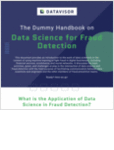 | Data science is the combination of domain expertise, quantitative methods, and analytical skills to extract meaningful insights from large quantities of information. In the world of fraud detection, data science refers to the activities performed to process the data available for financial services, e-commerce, and other firms to This new report, created by Datavisor, provides an introduction to the use of machine learning to fight fraud in digital businesses, including financial services, e-commerce, and social networks. It discusses the main activities, goals, and challenges at play in the intersection of data science and fraud detection with the main purpose of facilitating communication between data scientists and engineers and the other members of fraud prevention teams. In this report, you’ll gain insight on: 1. What is the Application of Data Science in Fraud Detection? In the world of fraud detection, data science refers to the activities performed to process the data available for financial services, e-commerce, and other firms to make it as useful as possible to detect and prevent fraud. 2. Steps for Fraud Detection What does constructing a data set typically involve in terms of information, attribute selection, and activities? What is involved in transforming a data set through feature engineering? 3. What Makes or Breaks a Good Fraud Strategy What are the velocity features, how are they created, what questions do they answer, and how do they contribute to fraud prevention? 4. Real-Life Use-Cases Involving Data Engineering Discover real-life use-cases from companies like Google and smartphone manufacturers. Request Free! |
